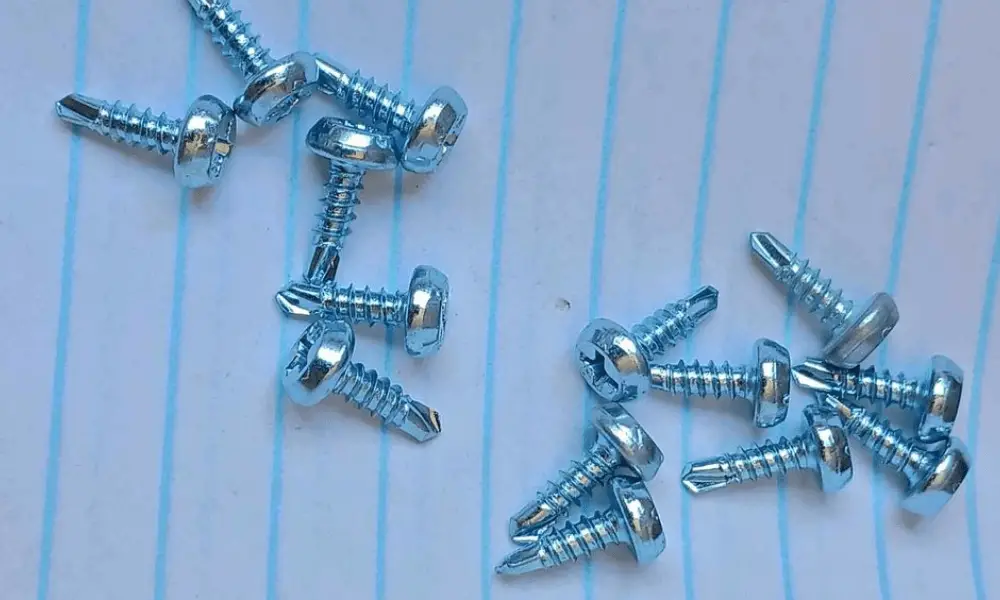When it comes to selecting screws for various projects, understanding their corrosion resistance is essential, particularly for outdoor or high-moisture environments. Zinc screws are commonly used due to their affordability and moderate resistance to rust. However, it’s important to recognize their limitations and consider the best applications for these screws.
Related: 5 Outdoor screws that won’t rust
Are zinc screws rustproof?
Zinc screws are not entirely rust-proof, but they do offer some level of corrosion resistance. Zinc plating provides a protective barrier against moisture and oxidation, which helps to slow down the rusting process. However, over time, the zinc coating may wear off or become compromised, making the screws more susceptible to rust. For outdoor projects, particularly in harsh environments or areas with high moisture content, it is generally recommended to use stainless steel or galvanized screws, as they offer superior rust resistance compared to zinc screws.
The Corrosion Resistance of Zinc Screws
Zinc plating
The protective layer of zinc on the surface of screws acts as a barrier against corrosion. It provides initial resistance to rust and oxidation by preventing direct contact between the underlying metal and the environment.
Moderate corrosion resistance
Zinc screws offer a moderate level of corrosion resistance, making them suitable for indoor applications and non-extreme outdoor environments. They can withstand normal atmospheric conditions and occasional moisture exposure.
Limitations of zinc screws
Despite their corrosion resistance, zinc screws have limitations that need to be considered:
- Exposure to harsh environments: In highly corrosive environments, such as coastal areas or regions with high levels of humidity or industrial pollutants, zinc screws may not provide sufficient protection against rust. The zinc coating can wear off more quickly, leaving the screws vulnerable to corrosion.
- Long-term durability: Over time, the zinc coating on screws can degrade or become damaged, increasing the risk of rust formation. Therefore, for long-term projects or structures exposed to continuous moisture, it is advisable to consider alternative options.
Best Applications for Zinc Screws
- Indoor projects: Zinc screws are suitable for indoor applications where the exposure to moisture and harsh elements is minimal. They are commonly used in furniture assembly, cabinetry, and general woodworking projects.
- Temporary installations: For temporary structures or projects that will be disassembled in the future, zinc screws can be a cost-effective option. They provide adequate corrosion resistance for short-term use.
Alternatives for Enhanced Corrosion Resistance
- Stainless steel screws: Stainless steel screws, particularly those made from marine-grade stainless steel (such as 304 or 316), offer superior corrosion resistance compared to zinc screws. They are highly recommended for outdoor projects in coastal areas, high-humidity regions, or where prolonged exposure to moisture is expected.
- Galvanized screws: Galvanized screws are coated with a layer of zinc, providing better corrosion resistance than standard zinc screws. They are commonly used in outdoor construction, fencing, and decking projects.
- Polymer-coated screws: Polymer-coated screws, such as epoxy-coated or ceramic-coated screws, offer enhanced rust resistance. The polymer coating provides an additional layer of protection, making them suitable for outdoor applications, including decks, fences, and siding.
Proper Installation and Maintenance
To maximize the lifespan of zinc screws and minimize the risk of rust, it is important to follow proper installation and maintenance practices:
- Pre-drilling: When using zinc screws, pre-drilling pilot holes can help reduce the chances of damaging the coating and ensure proper fastening without excessive force.
- Regular inspections: Regularly inspect the screws for signs of corrosion or degradation. Replace any compromised screws promptly to maintain structural integrity.
- Maintenance and finishes: Applying appropriate protective finishes, such as sealants or paint, to the project surface can further enhance the durability of zinc screws.
Read Next
• https://improvewood.com/are-zinc-screws-rustproof/
• https://improvewood.com/best-screws-for-outdoor-use/
• https://improvewood.com/best-screws-for-plywood/
• https://improvewood.com/5-best-woods-for-outdoor-fence/
• https://improvewood.com/what-is-the-most-weather-resistant-wood/
• https://improvewood.com/how-to-treat-wood-for-outdoor-use/
Conclusion: Are zinc screws rustproof
Zinc screws offer moderate corrosion resistance and are suitable for indoor applications and non-extreme outdoor environments. However, they have limitations in highly corrosive environments or long-term projects exposed to continuous moisture. For enhanced corrosion resistance, stainless steel screws, galvanized screws, or polymer-coated screws are recommended. By understanding the strengths and limitations of different screw options and considering the specific requirements of your project, you can make informed decisions to ensure long-lasting durability and structural integrity.
Are stainless steel screws rust proof
Stainless steel screws are highly resistant to rust and corrosion, making them an excellent choice for outdoor and high-moisture applications. The alloy composition of stainless steel, particularly grades like 304 and 316, provides superior protection against rust formation. However, it’s important to note that stainless steel screws can still experience some degree of surface discoloration or corrosion in certain conditions. Factors such as exposure to harsh chemicals, chlorides (e.g., saltwater), or extreme environments can impact their corrosion resistance. Nevertheless, stainless steel screws offer long-lasting durability and are widely regarded as a reliable option for projects requiring excellent rust resistance.
Do galvanized screws rust
Galvanized screws are designed to have a high level of resistance to rust and corrosion. They are coated with a layer of zinc, which acts as a protective barrier against moisture and other elements that can cause rusting. The zinc coating creates a sacrificial layer that corrodes before the underlying steel, effectively preventing the screws from rusting. However, over time and with prolonged exposure to harsh conditions, the zinc coating can wear off or become damaged, exposing the underlying steel to potential rusting. Therefore, while galvanized screws offer good rust resistance, their long-term durability and resistance to rust depend on the quality of the galvanized coating and the severity of the environmental conditions they are exposed to. It’s important to select high-quality galvanized screws and consider the specific application and environmental factors when choosing the right fasteners for your project.
